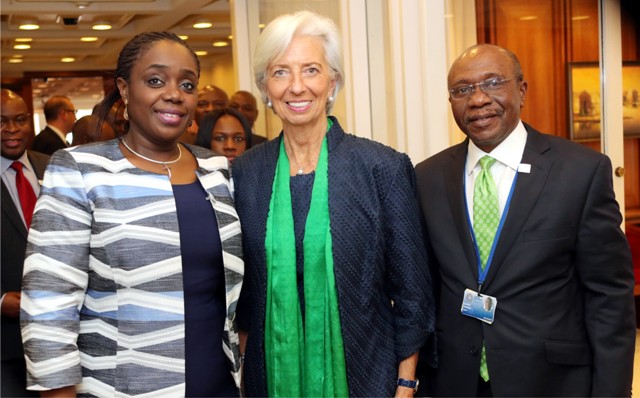Business
IMF Tasks Nigeria On Monetary Policy Reforms

The International Monetary Fund (IMF) mission to Nigeria says exchange rate and monetary policy reforms, increased revenue mobilisation and structural reforms will unlock Nigeria’s growth potential.
The team lead, Ms Jesmin Rahman, said this in a statement issued on Friday in Washington D.C at the conclusion of the virtual mission.
The mission was conducted from October 30 to November 17, in the context of the 2020 Article IV Consultation with Nigeria.
Rahman said that the COVID-19 pandemic was exacting a heavy toll on Nigerian economy, already experiencing falling per capita income and double-digit inflation, with limited buffers and structural bottlenecks.
According to her, low oil prices and sharp capital outflows have significantly increased Balance Of Payments (BOP) pressures; together with the pandemic-related lockdown, led to a large output contraction and increased unemployment.
She said that under the current policies, the outlook was challenging as real Gross Domestic Product (GDP) was projected to contract by 3.4 per cent in 2020.
“The recovery is projected to start in 2021, with subdued growth of 1.2 per cent and output recovering to its pre-pandemic level only in 2022.
“In spite of an expected easing of food prices, inflation is projected to remain in double-digits and above the Central Bank of Nigeria’s (CBN) target range and absent monetary policy reforms,’’ she said.
Rahman, however, acknowledged the efforts of the Federal Government in rising to the challenges, adding that it undertook commendable and timely measures to counter the pandemic’s impact on lives and livelihoods.
Accordign to her, the government adopted a revised budget in July which removed fuel subsidies and prioritised spending to make room for a support package.
She also said that the government has also taken courageous steps to remove costly and untargeted subsidies in the power sector, which were largely benefiting better-off households.
“However, more needs to be done. Major policy adjustments embracing broad market and exchange rate reforms are needed to address recurrent BOP pressures and raise the medium-term growth path.
“A durable solution to Nigeria’s recurrent BOP problems requires recalibrating exchange rate policies to reduce it risks, instill market confidence and facilitate private sector planning,” Rahman said.
“The adjustments in the official exchange rate made earlier this year are steps in the right direction and the mission recommended a multi-step transition to a more unified exchange rate regime, with a market-based, flexible exchange rate,’’ Rahman said.
She further said that significant revenue mobilisation, including through tax policy and administration improvements, was required to create space for higher social spending and reduce fiscal risks and debt vulnerabilities.
She, however, commended some other policies, noting that the mission welcomed this year’s reduced dependence on CBN’s financing of the budget and recommended its complete removal in the medium term.
Transport
Nigeria Rates 7th For Visa Application To France —–Schengen Visa

Transport
West Zone Aviation: Adibade Olaleye Sets For NANTA President

Business
Sugar Tax ‘ll Threaten Manufacturing Sector, Says CPPE

In a statement, the Chief Executive Officer, CPPE, Muda Yusuf, said while public health concerns such as diabetes and cardiovascular diseases deserve attention, imposing an additional sugar-specific tax was economically risky and poorly suited to Nigeria’s current realities of high inflation, weak consumer purchasing power and rising production costs.
According to him, manufacturers in the non-alcoholic beverage segment are already facing heavy fiscal and cost pressures.
“The proposition of a sugar-specific tax is misplaced, economically risky, and weakly supported by empirical evidence, especially when viewed against Nigeria’s prevailing structural and macroeconomic realities.
The CPPE boss noted that retail prices of many non-alcoholic beverages have risen by about 50 per cent over the past two years, even without the introduction of new taxes, further squeezing consumers.
Yusuf further expressed reservation on the effectiveness of sugar taxes in addressing the root causes of non-communicable diseases in Nigeria.
-

 News3 days ago
News3 days agoDon Lauds RSG, NECA On Job Fair
-

 Niger Delta24 hours ago
Niger Delta24 hours agoPDP Declares Edo Airline’s Plan As Misplaced Priority
-

 Sports1 day ago
Sports1 day agoSimba open Nwabali talks
-

 Nation1 day ago
Nation1 day agoHoS Hails Fubara Over Provision of Accommodation for Permanent Secretaries
-

 Transport1 day ago
Transport1 day agoNigeria Rates 7th For Visa Application To France —–Schengen Visa
-
Niger Delta1 day ago
Stakeholders Task INC Aspirants On Dev … As ELECO Promises Transparent, Credible Polls
-
Niger Delta24 hours ago
Students Protest Non-indigene Appointment As Rector in C’River
-

 Oil & Energy1 day ago
Oil & Energy1 day agoElectricity Consumers Laud Aba Power for Exceeding 2025 Meter Rollout Target

